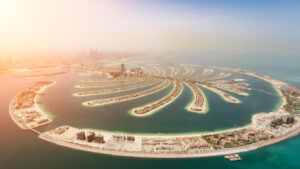The Future of Free Zones: Enhancing Ease of Doing Business in the UAE

The UAE has long been recognized as a global business hub, offering a strategic location, world-class infrastructure, and a pro-business regulatory environment. One of the key drivers of its economic success is its extensive network of free zones, which provide entrepreneurs and multinational corporations with unique incentives, from tax exemptions to full foreign ownership. As the UAE continues its efforts to diversify its economy, free zones are evolving to enhance the ease of doing business, attract global talent, and support innovation-led growth.
The Role of Freezone in the UAE’s Economic Growth
Freezones play a crucial role in the UAE’s economic strategy, contributing significantly to non-oil GDP. With over 40 free zones across the country, these specialized business districts cater to industries such as technology, media, logistics, healthcare, and finance. They provide an ecosystem that fosters business expansion, offering streamlined licensing procedures, reduced bureaucracy, and strong regulatory support.
The UAE government has prioritized economic diversification, aiming to reduce reliance on oil revenues. Freezone company formations have been instrumental in this transition, attracting foreign direct investment (FDI) and encouraging entrepreneurship in high-growth sectors such as fintech, e-commerce, and artificial intelligence.
Key Trends Shaping the Future of UAE Freezone Business Setups
1. Digitalization & Smart Business Hubs
The UAE is at the forefront of digital transformation, and freezones are rapidly adopting AI-driven solutions, blockchain-based transactions, and automated business registration processes. Smart business hubs equipped with digital licensing services, e-government platforms, and AI-powered customer support are reducing setup time for businesses from weeks to just days.
2. Sector-Specific Innovation Clusters
While traditional freezones cater to broad industry categories, the future is moving towards highly specialized innovation clusters. For example:
- Dubai Internet City (DIC) focuses on tech startups, AI, and cloud computing.
- Masdar City in Abu Dhabi champions renewable energy and sustainability.
- Dubai Healthcare City (DHCC) is dedicated to medical research and healthcare innovation.
These sector-specific zones provide tailored regulatory frameworks, industry networking, and funding opportunities, making them ideal launchpads for industry disruptors.
3. Integration with the Mainland Economy
Historically, business setups in freezones operated separately from the mainland economy. However, recent policy shifts are fostering greater integration. Companies registered in freezones now have expanded access to UAE markets, allowing them to trade more freely with onshore businesses while maintaining their tax advantages and regulatory benefits.
4. Expansion of Dual Licensing & Remote Business Operations
To further attract global talent, the UAE has introduced dual licensing options, enabling free zone companies to operate on the mainland without requiring additional approvals. Additionally, the rise of remote work visas and digital nomad permits allows international entrepreneurs to establish their presence in the UAE freezones without the need for a physical office.
5. Enhanced Investor & Talent Incentives
The UAE government continues to roll out policies to attract high-net-worth investors and skilled professionals. Programs such as the Golden Visa and Green Visa offer long-term residency benefits, while business-friendly free zone policies include:
- 100% foreign ownership with no local partner required.
- Zero corporate and personal income tax (in most free zones).
- Customs duty exemptions for imports and exports.
- Streamlined visa processing for entrepreneurs and employees.
These incentives are making UAE free zones a preferred choice for startups, SMEs, and multinational corporations alike.
Why Freezones are the Future of Business in the UAE
With the UAE’s commitment to becoming a global trade and innovation hub, freezone company setups in the UAE will continue to play a pivotal role. As Expo 2020 Dubai’s legacy projects take shape and initiatives such as Dubai’s D33 Economic Agenda unfold, the country is set to attract more investment across emerging sectors. Entrepreneurs and businesses seeking growth, market access, and regulatory ease will find company formation in the UAE freezones to be the ideal launchpad for success.
How Xiffin Can Help You Set Up Your Business in a UAE Freezone
Navigating the business setup process in a UAE freezone can be complex, but Xiffin makes it simple. Whether you need assistance with business registration, licensing, tax compliance, or visa services, our team ensures a hassle-free experience. With deep expertise in UAE regulations, we help you select the right freezone, streamline the documentation process, and get your business up and running smoothly.
To get started with your company formation in a UAE freezone, reach out to us!


